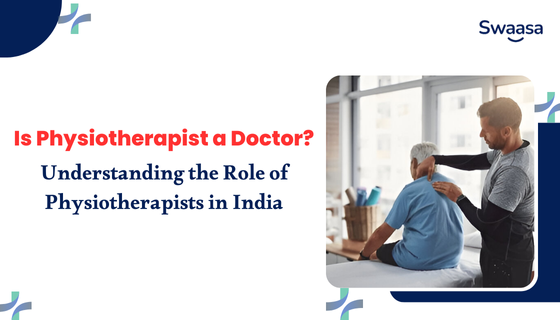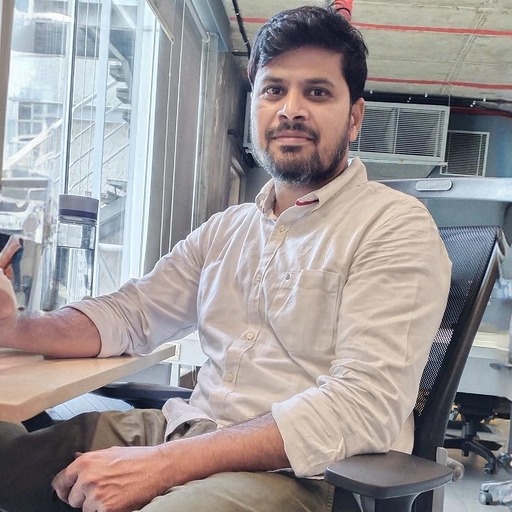
Is Physiotherapist a Doctor? Understanding the Role of Physiotherapists in India

07-Nov-2024
Is Physiotherapist a Doctor? Understanding the Role of Physiotherapists in India
Many people in India often wonder, "Is a physiotherapist a doctor?" The role of physiotherapists is crucial in the healthcare system, but their qualifications and titles can sometimes lead to confusion. This article dives into the details of what physiotherapists do and clarifies whether they can be called doctors.
Table of Contents
- Introduction to Physiotherapy
- Is Physiotherapist a Doctor?
- Physiotherapist vs. Doctor: What’s the Difference?
- Educational Requirements of Physiotherapists in India
- Key Responsibilities of Physiotherapists
- Physiotherapy and the Use of the "Dr." Prefix
- Role of Physiotherapists in Healthcare
- Conclusion: Should Physiotherapists Be Called Doctors?
1. Introduction to Physiotherapy
Physiotherapy is an essential part of healthcare, focusing on the treatment of injuries, disabilities, and disorders through physical methods such as exercises, manual therapy, and electrotherapy. Physiotherapists help patients regain movement, reduce pain, and improve their physical abilities.

2. Is Physiotherapist a Doctor?
In simple terms, a physiotherapist is not a doctor. While physiotherapists undergo extensive education and training, they are different from medical doctors who hold an MBBS degree. This is a common question — “Is a physiotherapist a doctor in India?” — but the answer remains clear: physiotherapists are healthcare professionals, but they are not medical doctors.
Can Physiotherapists Be Called Doctors?
No, physiotherapists are not referred to as doctors in India. Although they provide essential healthcare services, their education and scope of practice differ from those of medical doctors.
3. Physiotherapist vs. Doctor: What’s the Difference?
It’s important to understand the difference between physiotherapists and doctors. Here’s a comparison table to highlight the main distinctions:
Aspect: Physiotherapist vs. Doctor
Physiotherapist:
Education:
- BPT (Bachelor of Physiotherapy)
- MPT (Master of Physiotherapy)
Scope of Practice:
Focuses on rehabilitation, physical therapy, and pain relief
Role in Patient Care:
Helps patients recover from injuries, surgeries, and chronic conditions through physical methods
Use of "Dr." Title:
Not allowed unless they have a doctoral degree (PhD)
Doctor:
Education:
- MBBS (Bachelor of Medicine and Bachelor of Surgery)
- MD/MS (specialization)
Scope of Practice:
- Diagnoses, prescribes medications, and performs surgeries
Role in Patient Care:
- Provides medical treatment, performs surgeries, prescribes medications
Use of "Dr." Title:
- Allowed to use the "Dr." title
4. Educational Requirements of Physiotherapists in India
To become a physiotherapist in India, one must complete a Bachelor of Physiotherapy (BPT), which is a 4-year undergraduate program. After the BPT, some professionals may pursue a Master of Physiotherapy (MPT), which provides specialization in areas like orthopedics, neurology, sports, or pediatric physiotherapy.
How Does the Education of a Physiotherapist Compare to a Doctor?
Physiotherapists undergo different training compared to doctors. While physiotherapists focus on rehabilitation and physical health, doctors are trained to diagnose, treat, and prescribe medication for a wide range of medical conditions.

5. Key Responsibilities of Physiotherapists
Physiotherapists play a significant role in helping patients recover and regain mobility after injuries or surgeries. Some of their key responsibilities include:
Assessing physical conditions: Evaluating the patient’s physical abilities, posture, and movement patterns.
Developing personalized treatment plans: Creating exercise programs and therapeutic techniques to improve movement.
Manual therapy: Using hands-on techniques such as massage and joint manipulation to relieve pain and improve function.
Rehabilitation: Helping patients recover after surgeries, injuries, or chronic illnesses.
Educating patients: Teaching individuals how to perform exercises at home to maintain progress and prevent further injuries.
6. Physiotherapy and the Use of the "Dr." Prefix
One of the most frequently asked questions is whether physiotherapists can use the "Dr." prefix. In India, physiotherapists are not allowed to use the title "Doctor" unless they have a doctoral degree like a PhD. This is because their training and expertise are focused on physical therapy rather than medical diagnosis or surgery.
Why Can’t Physiotherapists Use the Title "Dr."?
Although physiotherapists have advanced education and play a vital role in patient care, their qualifications are different from those of medical doctors. Doctors go through extensive medical training and are authorized to diagnose diseases, prescribe medications, and perform surgeries, whereas physiotherapists specialize in physical recovery and rehabilitation.
7. Role of Physiotherapists in Healthcare
Physiotherapists are essential in healthcare, especially when it comes to recovery from injury, surgery, or chronic conditions. They work in various settings, including hospitals, clinics, sports centers, and even home care. Some common areas where physiotherapists provide their expertise include:
Post-surgical rehabilitation: Assisting patients after surgeries such as joint replacements or ligament repairs.
Pain management: Treating conditions like back pain, neck pain, and arthritis using physical therapy techniques.
Sports injuries: Helping athletes recover from injuries and improve their performance.
Neurological conditions: Treating individuals with conditions like stroke, Parkinson’s disease, or spinal cord injuries to improve movement and function.
Pediatric care: Assisting children with physical disabilities or developmental delays to improve mobility and overall physical abilities.
Benefits of Physiotherapy
Non-invasive treatment: Physiotherapy is a non-invasive approach to managing pain and improving physical function.
Holistic care: It focuses on the entire body, addressing movement, strength, balance, and posture.
Personalized treatment plans: Physiotherapists design treatment plans specific to each patient’s needs.
Prevention of further injuries: Through education and targeted exercises, physiotherapists help prevent future injuries.
8. Conclusion: Should Physiotherapists Be Called Doctors?
To sum up, physiotherapists are highly skilled healthcare professionals, but they are not medical doctors. In India, they are not allowed to use the "Dr." prefix unless they have earned a doctoral degree. Their role is crucial in the recovery and rehabilitation of patients, especially those dealing with physical injuries, disabilities, or post-surgical care.
While physiotherapists may not be called doctors, their expertise and contribution to healthcare are invaluable. They play a key role in improving patients' quality of life through physical therapy, pain management, and rehabilitation.
FAQs: Is a Physiotherapist a Doctor in India?
1Q: What is the role of a physiotherapist in India?
Ans: A physiotherapist helps people recover from physical injuries, pain, or disability using exercises, manual therapy, and rehabilitation techniques. They support recovery without using medicines or surgery.
2Q: Can physiotherapists in India use the title ‘Dr.’?
Ans: Yes, as per new government guidelines, physiotherapists who have completed a Bachelor of Physiotherapy (BPT) from a recognised college can use the title ‘Dr.’ before their name. However, they must clearly mention “PT” (Physiotherapist) after their name.
3Q: Are physiotherapists considered medical doctors?
Ans: No, physiotherapists are not medical doctors (like MBBS holders). They are health professionals trained to treat physical conditions. Their field is different from mainstream medicine.
4Q: What is the educational qualification required to become a physiotherapist?
Ans: To become a physiotherapist in India, you must complete a Bachelor of Physiotherapy (BPT), which is a 4.5-year course including 6 months of internship. Some may go on to do a Master’s in Physiotherapy (MPT) for further expertise.
5Q: Is NEET exam needed for BPT admission?
Ans: In many states, BPT admissions are done through NEET-UG or other entrance exams. Some private colleges also conduct their own entrance tests or provide admission based on Class 12 marks.
6Q: What is the scope of physiotherapy in India?
Ans: Physiotherapy has a wide scope in India. You can work in:
- Government or private hospitals
- Sports teams or fitness centres
- Orthopaedic and neuro clinics
- Home care or private practice
It is a growing field with good demand, especially in urban areas.
7Q: Can a physiotherapist prescribe medicines?
Ans: No, physiotherapists cannot prescribe medicines. Their treatment is based on movement therapy, physical exercises, and techniques like ultrasound, heat therapy, and electrotherapy.
8Q: Is physiotherapy a good career option in India?
Ans: Yes, physiotherapy is a respected and rewarding profession in India. With increasing health awareness, ageing population, and more sports injuries, the demand for skilled physiotherapists is rising.
9Q: What is the average salary of a physiotherapist in India?
Ans: A fresher physiotherapist can earn around ₹15,000 to ₹25,000 per month. With experience and specialisation, this can increase to ₹50,000 or more per month, especially in metro cities or private clinics.
10Q: Which regulatory body controls physiotherapy in India?
Ans: Physiotherapists in India are governed by the National Commission for Allied and Healthcare Professions (NCAHP), which sets the rules for education, licensing, and ethical practice.
Bullet Points Summary:
Is a physiotherapist a doctor? No, physiotherapists are not doctors in India.
Education: Physiotherapists complete a BPT (Bachelor of Physiotherapy) or MPT (Master of Physiotherapy), while doctors complete an MBBS followed by specialization.
Role: Physiotherapists focus on rehabilitation and physical therapy, while doctors diagnose and treat medical conditions.
Use of "Dr." Title: Physiotherapists cannot use the title "Dr." unless they hold a doctoral degree.
Key responsibilities of physiotherapists: Include assessing physical conditions, developing treatment plans, providing manual therapy, and offering rehabilitation services.
Benefits of physiotherapy: It offers non-invasive, personalized treatment to improve mobility, strength, and prevent further injuries.
By understanding the role of physiotherapists, we can appreciate their vital contribution to patient recovery and overall healthcare.

AUTHOR


Related Jobs


